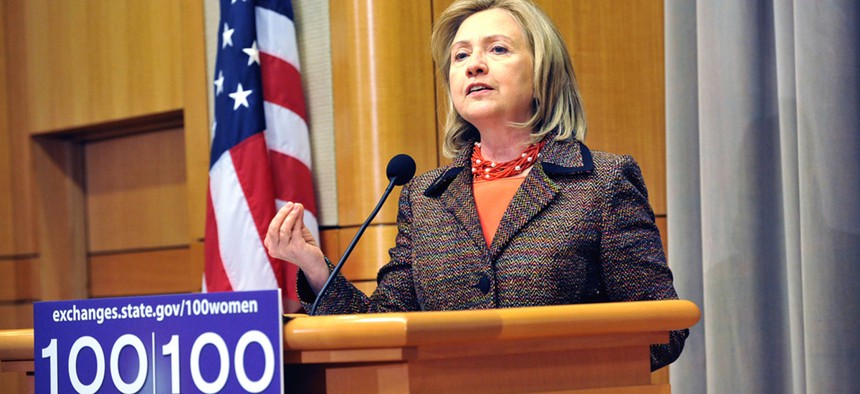
State Department file photo
Newly Released Emails Detail Benghazi Correspondence
Adviser to Clinton reported early evidence that attacks were not precipitated by anti-Islam video.
The New York Times on Thursday released 350 pages of Hillary Clinton's personal emails related to the attack on the U.S. Consulate in Benghazi, Libya, on Sept. 11, 2012. The emails are a subset of the 850 pages that the State Department turned over to the special House committee investigating the attack. And they are but a fraction of the 55,000 emails Clinton turned over to the State Department from her personal account earlier this year. The Times's analysis finds that the emails the newspaper received do not appear to contain classified information.
A few details immediately stand out.
1. On Sept. 12, 2012—the day after the attack that killed Amb. Chris Stevens and three other Americans—Clinton confidante Sid Blumenthal emailed the secretary of State intelligence details suggesting that demonstrators angered by an anti-Islam video had launched the assault. Blumenthal was not a State Department official, but rather a longtime Clinton friend and aide. According to the Times, Clinton forwarded Blumenthal's emails to Jake Sullivan, a State Department foreign policy adviser.
That initial Sept. 12 report contained information Blumenthal obtained about a conversation between senior security officials in Libya and the country's interim president at the time, Mohammed Magariaf. Blumenthal reported intelligence that the attacks "were also inspired by and linked to an attack on the U.S. mission in Egypt on the same day."
Another source told Blumenthal that a politically fraught "atmosphere" in the country—the result of "current covert efforts" to link Magariaf "directly to foreign intelligence services"—also significantly contributed to the attacks.
2. But Blumenthal soon emailed details contradictory to the video story: He advised Clinton that Libyan security officials suggest the attack was orchestrated by a Libyan terrorist organization with ties to al-Qaida. He wrote that sources said "the attacks had been planned for approximately one month."
Blumenthal wrote that Libyan security officials "do believe that the attackers having prepared to launch their assault took advantage of the cover provided by the demonstrations in Benghazi protesting an internet production seen as disrespectful to the prophet Mohammed." Libyan officials also reported that the "attackers were ... looking for an opportunity to approach the consulate under cover in a crowd."
Clinton responded to the message, "We should get this around ASAP." (According to the Times, this message was sent in response to Blumenthal's updated account of events.)
Despite that second account's revelations, the White House maintained for several days the narrative that an anti-Islam video precipitated the attack. On Sept. 16, 2012, then-United Nations Ambassador Susan Rice told ABC's This Week that "based on the information that we have at present ... in fact, what this began as, it was a spontaneous—not a premeditated—response."
3. According to the Times, Amb. Stevens wrote to Clinton a year and a half prior to the raid, and said he was considering leaving Benghazi due to security concerns. The email contained "sensitive but unclassified" information on Stevens's travel plans.
Earlier this week, a federal judge rejected the State Department's proposal to release Clinton's emails in one batch by January 2016 and instead ordered that emails from her tenure as secretary of State be released on a rolling basis. Clinton told reporters Tuesday that she has asked the State Department to "please move as quickly as they possibly can" on the release of her emails.
Priscilla Alvarez contributed to this article.






